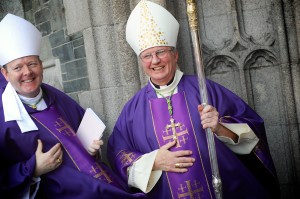
By Sarah Mac Donald - 23 October, 2014
 The Bishop of Derry has expressed regret that the media coverage of the first stage of the synodal process in Rome focused almost exclusively on communion for the remarried and recognition of same-sex relationships to the exclusion of other issues.
The Bishop of Derry has expressed regret that the media coverage of the first stage of the synodal process in Rome focused almost exclusively on communion for the remarried and recognition of same-sex relationships to the exclusion of other issues.
In his homily at a Mass on Monday at Our Lady of Lourdes, Steelstown to mark the 40th anniversary of ACCORD in Derry, Bishop Donal McKeown said he felt the Synod process is a great chance for big questions to be asked, not merely of the Church but of civil society.
“The reality for numerous European countries is that they have more deaths than births,” Dr McKeown said and cited Italy, Spain, Germany and France where declining birth rates have presented governments with a range of challenges.
He said the “big question for governments” is not merely about remarriage or ‘marriage equality’.
“The big challenge for many western governments is how to have fiscal and other policies that encourage the birth of children, rather than just arguing how to avoid having to give birth to babies through contraception or abortion.”
He also criticised moves by Belgium to permit assisted suicide for children and minors.
The future of our societies and the emotional welfare of children is always more important that the preferences of adults, he said.
“Children are people, not acquisitions. The present legal structures and vocabulary suggests that the most important priority is how adults live their lives, centred only on the right to exercise your rights. This focus on the present suggests little concern for the future,” the Bishop of Derry warned.
Elsewhere in his homily, Dr McKeown said that the Church has a rich theology of the body and of human marriage and he expressed concern that this would be lost with the new emphasis on pre-nups or the “self-indulgent exercise in serial monogamy.”
The work of ACCORD is not about pushing some out-dated Catholic morality that so many of our modern role models think would cramp their immature style, the bishop assured the assembled ACCORD volunteers.
“Your work is about helping people to have high expectations of themselves and of their relationships (through pre-marriage courses) and to face the problems that arise from sharing your home and bed with another person.”
“Your work is about telling people that they are capable of great things, that problems may be more of an opportunity for growth than a burden to crush them” and he added that ‘Believe in better’ is the divine call.
Underlining that life is very difficult for young people, Bishop McKeown recalled Deirdre O’Rawe relating in the Guildhall last week that nearly half of all British 16-year-olds are not living with their two biological parents.
He said it is hard for these teenagers to believe in faithful love if they have not experienced what it means in their own homes.
In some cases ACCORD’s pre-marriage courses are not just struggling with young couples’ religious understanding of the sacrament or with any idea of the possible sacredness of marital intimacy, he explained and added, “The notion of recreational sex has already damaged any Christian theology of the body as a temple of the Holy Spirit.”
The Bishop also noted that many young people have family role models and public heroes, “whose personal lives are deserts, focused on living the good life with no sense that it is possible to live a good life.”
He told the ACCORD workers that their pre-marriage course may be one of the few opportunities for these young people to hear adults speaking about a different form of relationship.
“Help them believe in a God and a Church that cares for the quality of their personal lives. Help them forgive themselves and others. Give them the spiritual and emotional intelligence to process all the pain of being human. These are skills that many of them will have never experienced before,” Bishop McKeown urged.
“I encourage you, not to see this as some diehard Catholic way of resisting the inevitable wave of progress. You are dealing with issues that affect the welfare of society and the future of our communities,” he said.
“You are not just one more counselling organisation. You are part of the Church that wants to speak of love, to point to a solid rock on which people can build and the faithfulness of God to his covenant with the world.”